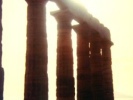
Sacred Texts Classics Index Previous Next
Buy this Book at Amazon.com


Fragments that Remain of the Lost Writings of Proclus, by Thomas Taylor, [1825], at sacred-texts.com
"It is requisite to know that the divine Proclus, in his Commentaries on the Timæus * of Plato, refers metals to the seven planets, and says, that lead is ascribed to Saturn, through its weight, dulness, and coldness. But electrum [or a metal composed of gold and silver] is referred to Jupiter, through the well-tempered and vivific nature of the star. In a similar manner, also, with respect to the metal which is called migma; † but the migma is more highly valued than gold, and is well tempered. Again, iron is ascribed to Mars, on account of its incisive power and sharpness; but gold to the sun, which is, as it were, the fountain of light. Copper is referred to Venus, on account of its florid nature; and also because
[paragraph continues] Venus is near to the sun, in the same manner as copper is to gold. Tin is referred to Mercury, through its clearness and splendour, and at the same time, likewise, because Mercury is near to the moon, just as tin is to silver. And silver is ascribed to the moon; since silver when placed near to gold, appears to be illuminated by the gold, and to become more splendid, in the same manner as the moon is illuminated by the sun."
108:* This extract probably formed a part of a Sixth Book of Proclus on the Timæus, which is lost, as it is not to be found in any of the Five Books that are now extant.
108:† From what Proclus says of this metal, called migma, or, a mixture, it appears to be the same with orichalcum, which Plato, in the Critias or Atlanticus, says, "shines with a fiery splendour." Pliny, in list. Nat. lib. xxxiv. cap. 2, says, that this kind of metal has not existed for a long time, owing to the barrenness of the earth. It is, however, mentioned by Martianus the lawyer, who flourished in the time of Alexander Severus, as if it then existed.